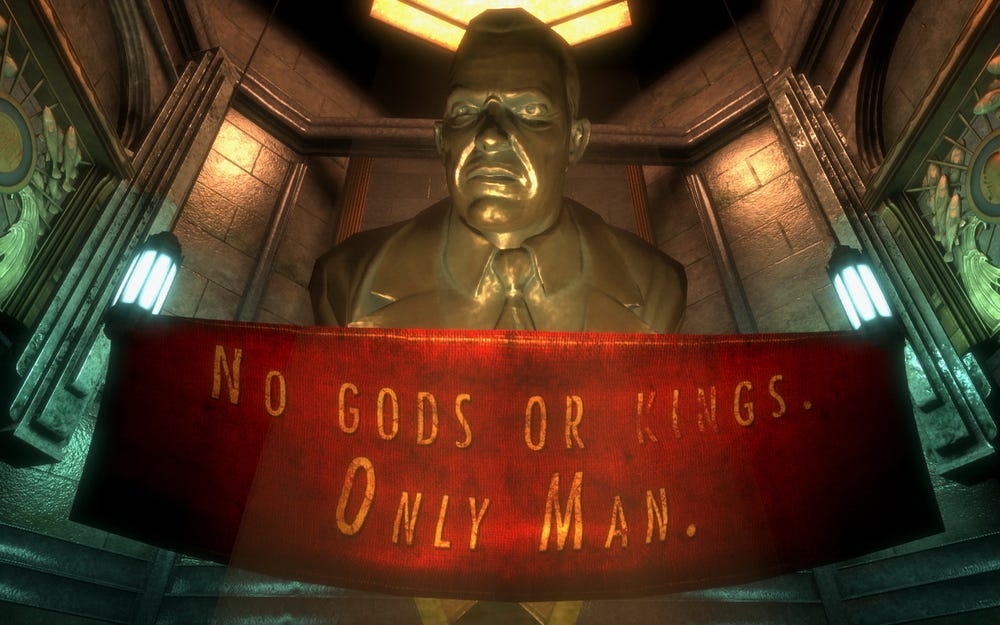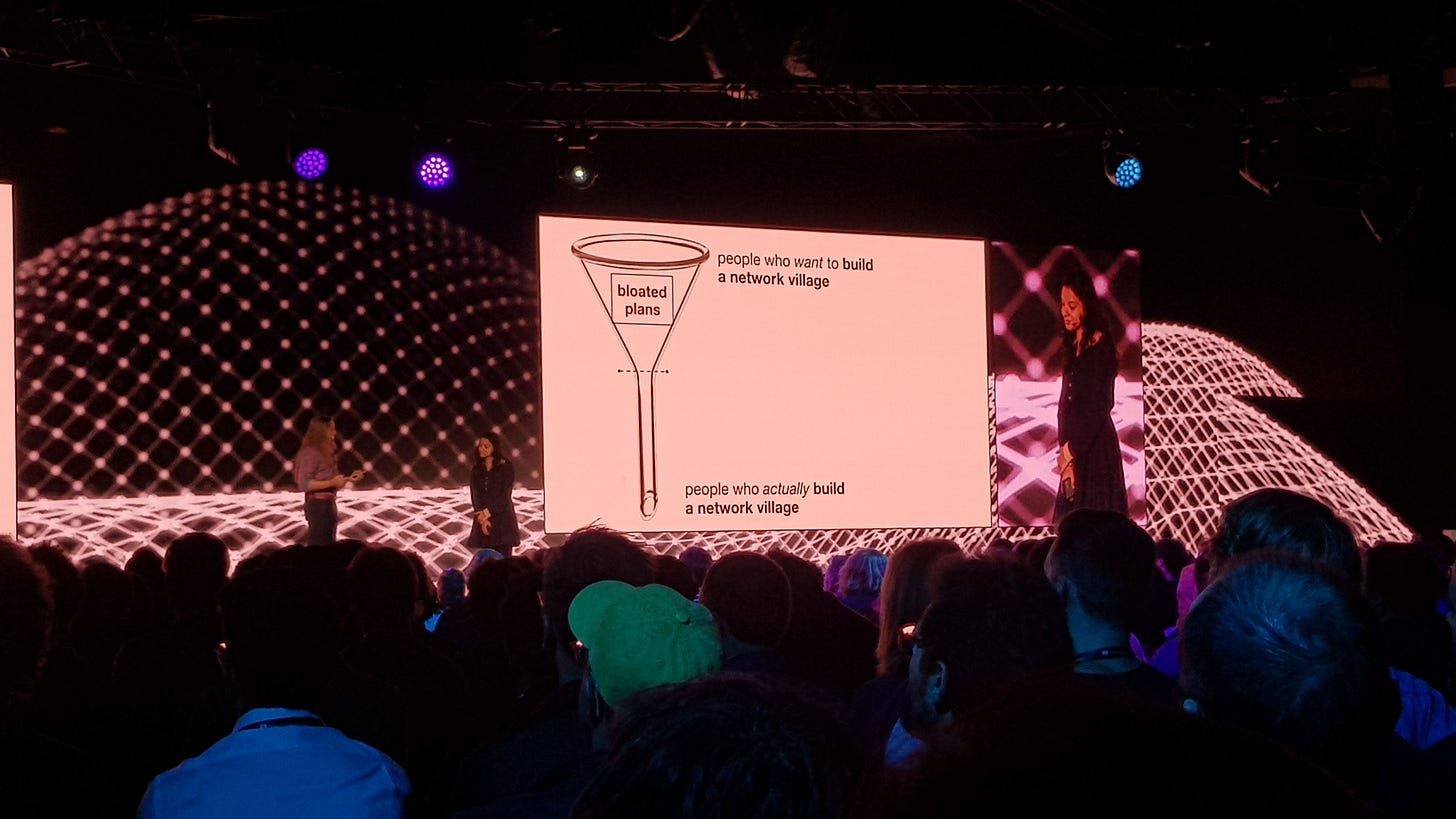Would You Kindly Build a Better Future: Thoughts on Network State Conference
I attended this conference with hopes of understanding who is building blueprints for a better society.
Quick ask: do you plan to attend any conferences in 2024? Let me know which ones in this survey, and whether you’d be interested in joining a week-long networking retreat!
I’ll admit: I went to the Network State conference because someone said there aren’t enough women interested in network states.
And I’m not one to back down from a challenge.
I didn’t know what “network state” meant, but I’m very interested in conversations about building better societies and investing in humanity’s success. It seemed like an opportunity to listen to great talks and have inspiring conversations.
What I learned is that network states are about building nations from communities of people who choose to align themselves. As it currently stands, people are born into nations without much choice as to whether they want to be part of those nations. Some of us have the flexibility and privilege to immigrate and even change our nationalities—though we are a select few in the world.
And so the concept of network states has grabbed the attention of many thought leaders, degens, and entrepreneurs who want to make the world a better place.
Two things stood out to me from the people, projects, and companies presenting:
No one really seemed to address the accessibility for all classes and nationalities; and
No one addressed the need for independent infrastructure (i.e. clean water, electricity, land, security…)
Much of it reminded me of Andrew Ryan from BioShock. Like Ryan, many speakers proposed a paradise only few could afford, without consideration for everything—and everyone—it takes to run a functioning society.
Crash Course in BioShock
In short, Andrew Ryan created Rapture as a libertarian’s paradise under the sea (where the game takes place). And as you can expect, it all went horribly wrong.
Ryan wanted a place of absolute free market capitalism…or so he said. Contact with the outside world was not permitted (including trade), and all forms of religious expression were banned. Charitable organizations and social welfare programs were also non-existent in order to prevent “parasites”. And when another citizen became an exceedingly popular public figure, Ryan had him eliminated.
Yet Ryan insisted that Rapture was still the epitome of free thought and free markets. People just didn’t understand it yet:
“I plan to start a new program of civic education. Banners, a great many more of them—educational announcements on televisions and public address, and billboards! I’m bringing in someone to help us train them to see that the world outside of Rapture is the real prison…and Rapture is the real freedom.”
Rapture had freedom, according to Ryan’s needs and conditions.
In all fairness, the communist uprising that Sophia Lamb led in BioShock 2 also went horribly awry. And BioShock Infinite’s Columbia, a city of American exceptionalism built by Zachary Comstock, fails its citizens as well. While these games are works of fiction, they illustrate the dangers of unfettered idealism and extreme isolation.
Miracles Need a Lot of Maintenance
While I wouldn’t necessarily liken any speakers from Network State to Andrew Ryan (though the founder of Seasteading may literally come close), I still have similar concerns.
Many of the projects and companies that pitched didn’t offer any suggestions for forms of government or regulation. This, naturally, led to criticisms among attendees of “glorified co-working spaces” and “sleepaway camp for rich people.”
Furthermore, there were no explanations of how these network states would be sustainable. How is the health, wealth, and well-being of these new states measured? Currency? Economy? Trade with the outside world will be absolutely necessary, yet these new states will also need a thriving internal economy to attract and retain citizens.
And how do people legally reside here? How are borders enforced and citizenship attained? As someone who lives full-time in a country where I’m not a citizen, I know how quickly these things can become complicated. And for anyone following international news, keeping people out border security is a hot topic in richer countries.
And once those citizens—likely wealthy individuals—settle down, who will manage utilities? Sewage? Imports and exports? From what I understood at the conference, most of these new states relied on existing nations to manage and supply basic infrastructure. But if these nations are to become self-sustaining, they’ll need more than rich tech bros and idealists.
To top it all off, what truly prevents any individual (or group of individuals) from consolidating and abusing power in these new states? We can certainly take our learnings from successful DAO structures, but it’s yet to be seen whether a decentralized form of nation governance can work.
Put simply: wealth and idealism will not be enough to maintain lasting nations. And it’s given me much food for thought when it comes to choosing investment opportunities.
In Defense of Simply Building
No one said that these network states were for everyone. Unlike our current state of citizenship, people have to choose to join these states. These concepts are about bringing like-minded people together, not satisfying the masses or replicating existing structures.
As the Fractal founders Andrew and Priya shared in their talk, it takes a lot of determination to get something out of the group chat and into real life. Almost everyone at the conference has actually started implementing the dreams they had of a better society. Folks had invested their own time and capital into taking their online communities offline, trying (and sometimes failing) to create something new. And that absolutely deserves recognition.
This may also be an argument—a call to action, rather—for more women to join these conversations. While women will often weigh every option and take time to build the perfect plan, men will move fast and break things. If we build separately, a woman will release her well-constructed version 1.0 by the time the men are on version 6.9 of their network state concept.
When it comes to building something as important as a new nation, I wouldn’t take it very lightly. But maybe I (and other like-minded women) need to move a little faster if we want to participate in this process.
Final Thoughts
Perhaps the purpose of this whole event was to make people think and share their ideas of what the future should look like.
I really do admire the folks building solutions for a better society. These are the kind of thinkers I want to invest in. But I’d love to see everything taken even a step further in regards to the hard implementation of building new states.
Seems like some of us may need to stop pontificating (myself included) and really start building.
PS - Balaji, if you’re looking for content for Network State 2024, I’d be happy to moderate or participate in a discussion based on this article.



